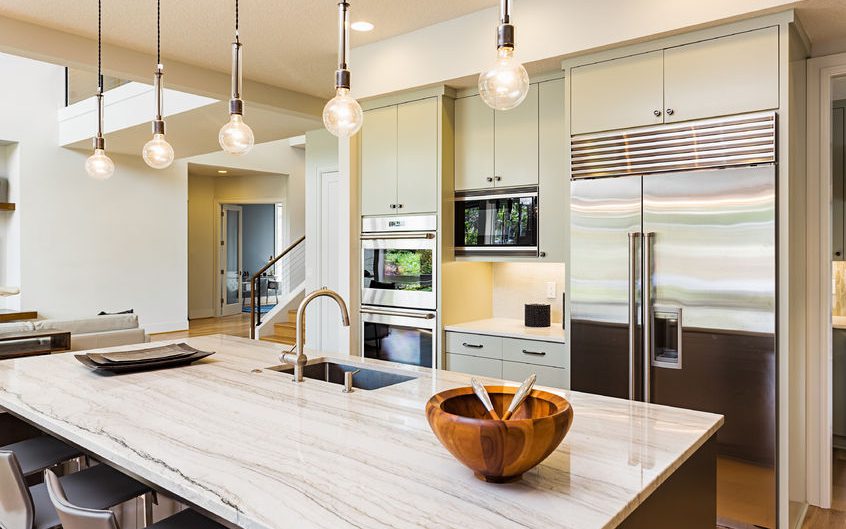The kitchen is often the central part of a family’s home, and its appliances are heavily relied on for preparation and cleanup of daily meals. From the sink’s faucet and garbage disposal to the drain and dishwasher, the kitchen’s plumbing is a complex system. When one feature backs up, it’s likely to cause a chain reaction of problems if unaddressed.
Luckily, not every plumbing mishap in the kitchen is worthy of a call for professional help. Some kitchen plumbing problems have simple remedies and others can be avoided with proper usage and maintenance. Follow these guidelines and tips to avoid and simply repair common kitchen plumbing problems with your faucet, drain, garbage disposal and dishwasher.
Kitchen Sink Faucet
In most households, not a day goes by without running the kitchen faucet. Like bathroom sink faucets, this constant use can cause normal wear and tear on the appliances. If you begin experiencing a loss of water pressure, mineral buildup on the inside of the faucet and around the spout is likely the culprit. Especially for those with hard water, take the faucet apart and soak the pieces in vinegar. Make this a regular chore to prevent low water pressure and corrosion.
If your faucet forms a small leak around the base of the spout, a part may need replacing, such as the O-ring. For how-to articles about repairing, removing and replacing kitchen faucets, check out DIY Network.
Kitchen Sink Drain
The kitchen drain often acts as a black hole for anything and everything left on our plates, pans and even counters. Unfortunately, this black hole doesn’t rid itself of its entrants quite as well as we might hope. Substances like cooking oils, grease and food waste build along the walls of the drain, eventually leading to a drain backup.
Instead of addressing a severe backup after it occurs, begin following proper usage and maintenance tips to avoid the problem altogether. First, properly dispose of grease and cooking oils by pouring these liquids into a can and throwing them in the trash rather than down your drain. Second, consider using a strainer as a drain cover in order to catch foods and debris that are better disposed of in the trash or compost. Third, regularly flush your kitchen’s sink drain with boiling water. This habit helps loosen grease and food debris from the sides of the drain. Finally, if you do experience drainage problems, try pouring a mixture of baking soda and vinegar down the drain to clean its sides.
Garbage Disposal
We often think the garbage disposal can handle whatever is thrown its way, but that’s not the case. The garbage disposal is a wonderful tool for ridding waste that does happen to make its way in, but proper protocol needs to be followed to ensure the life and effectiveness of the appliance.
Only organic wastes that are easy to dissolve should enter the drain to the garbage disposal—nothing fibrous, fatty, hard or sharp. When turning on the garbage disposal, run the water before, during and after. And, once a week, toss a few ice cubes in along with some vinegar (optional) and turn on the garbage disposal while running cold water through from the faucet. This will help remove any foods stuck to the blades.
Dishwasher
As previously stated, a kitchen’s plumbing is a complex system, with interconnecting pipes. The plumbing for the dishwasher is connected to the kitchen drain and garbage disposal. If the dishwasher is not draining water properly, there are three potential sources for the problem.
First, try emptying your garbage disposal by running it with cold water. Leave the cold water on for a few moments afterwards. Next, remove the drain basket from the dishwasher—a piece every dishwasher should have, located at the bottom or the side of the appliance—and wash it of debris. Finally, find the drain hose connecting from the dishwasher to the sink drain and make sure there are no kinks.
By properly maintaining your kitchen’s plumbing appliances, the less likely you are to run into problems requiring professional repairs. And for even healthier, long-lasting pipes, Houselogic recommends for homeowners to consider investing in a water softener and reducing water pressure.
No matter the level of care you take, general wear and tear is bound to occur. And plumbing repairs and replacements of even the most cared for appliances is eventually inevitable. For your Spokane plumbing needs, consider the trusted team at Glenrose Plumbing Service.
(Photo: ©breadmaker/123 RF Stock Photo)

